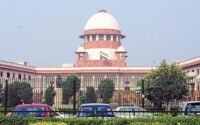THE CHILD’S BUILD: A JUDICIAL APPROACH
This article is written by Bhavya Verma of JEMTEC, School of law and curated by Shruti Chaudhary of Dr. Ram Manohar Lohiya National Law University, Lucknow.
“There is no trust more sacred than the one the world holds with children. There is no duty more important than ensuring that their rights are respected, that their welfare is protected, that their lives are free from fear and want and that they can grow up in peace.”- Kofi Annan
From the Seventh Five-Year Plan onward, the judiciary, especially the Hon’ble Supreme Court have played a significant role in upholding children’s rights. The following cases are some of the most important examples of social action litigation for children, each of which was a milestone in the process of ensuring children’s rights.
- Bharwada Bhoginbhai Hirjibhai v. State of Gujarat, AIR 1983 SC 753: The accused, a middle-aged man, had confined his daughter’s two friends around the age of 10, who had come to visit the daughter in his house and raped them. The trial court found the accused to have been guilty of rape, violating modesty and wrongful confinement. The High Court upheld the conviction though raising the charge for attempting rape from rape. On the basis that slight inconsistencies in the facts were not significant, the Supreme Court upheld the trial court’s judgment. The Apex Court also observed that in rape cases, there is no need for corroboration of conviction. For later decisions, this decision was relied upon to obtain prosecution when there were no other eye-witnesses for support of the victim’s evidence.
- Laxmikant Pandey v. Union of India, AIR 1984 SC 469: The Hon’ble Supreme Court laid down a few doctrines governing the rules for the implementation of inter-country adoption laws. The case was filed by an advocate, Laxmikant Pandey who addressed the court, alleging that social organisations and voluntary agencies engaged in the work of offering Indian children to foreign parents are indulged in malpractices.
- Sheila Barse v. Union of India, AIR 1986 SC 1883: The Apex Court issued a number of guidelines regarding the physically and mentally disabled children as well as abandoned or destitute children lodged for ‘safe custody’ in various country jails. The court further held that ‘In so far as an accused child is concerned with an offense punishable by imprisonment not exceeding 7 years, a period of 3 months from the date of filing of the complaint or filing of the First Information Report is the maximum time allowed for investigation and a period of 6 months from the filing of the charge sheet as a reasonable period within which the child’s trial must be completed. If that is not done, it would be liable to quash the prosecution against the child. Every government of any State shall give effect to this principle or norm in respect of any future case.’
- C. Mehta v. State of Tamil Nadu, JT 1990 SC 263: On child labour, the Court held that Articles 24, 39(e) and 9(f), 41 and 47 required the State to abolish child labour, thus maintaining children’s healthy growth. Under Article 32, the Government of India shall take legislative, administrative, social and educational steps to ensure that the child is safe from hazardous exploitation and healthy growth. In the domestic domain, the Court held that there are many pieces of legislation such as the Child Labour (Prohibition and Regulation) Act, 1986 (the Act), which protect children from abuse. The Court, however, took note of the fact that deprivation compels a family to force their child into dangerous work. The Court held that the statutory purpose behind the Act to ensure a child’s safe development was also important to be fulfilled.
- Vishal Jeet v. Union of India, 1990 (3) SCC 318: In the instant case, the Apex Court in order to eradicate the problems of child prostitution issued the following directions to the State governments and Union Territories:
- Instruct concerned law enforcement authorities to take effective and prompt steps to eliminate child prostitution under the current legislation.
- Take action to provide adequate, rehabilitative housing.
- Create a separate advisory committee made up of relevant government officials, sociologists, criminologists, women/child welfare/voluntary social organizations to make recommendations for the eradication of child prostitution; and victim care, safety, diagnosis, growth and recovery initiatives.
- Unnikrishnan v. State of Andhra Pradesh, 1993 (1) SC 645: The Supreme Court held that the right to basic education is implied by the fundamental right to life (Article 21 of the Constitution of India) when read in conjunction with the directive principle on education (Article 41 of the Constitution of India). The Court held that the parameters of the right must be understood in the sense of the Directive Principles of State Policy, including Article 45 which stipulates that the State shall endeavour to provide free and compulsory education for all children under the age of 14, within a period of ten years from the commencement of the Constitution.
- Delhi Domestic Working Women’s Forum v. Union of India, 1995 SCC (1) 14: Six young domestic workers were brutally harassed, assaulted and raped by Army personnel on a train from Ranchi to Delhi. Acknowledging the challenges encountered by the victims in the judicial process, this judgment provided some guidelines to be followed when dealing with sexual offenses such as:
- Proper legal aid should be given to complainants in sexual harassment cases.
- Legal assistance must be provided at the police station.
- It would be the responsibility of the police to remind the victim of their right to representation before any questions were asked about her.
- A list of advocates who are willing to act in such cases will be kept for victims at the police station.
- The lawyer shall be appointed at the court at the earliest possible time upon application by the police.
- Victim anonymity must be maintained in all rape cases, as far as possible.
- An appropriate and equitable financial compensation must be provided to the victims of rape.
- The court shall award compensation for the injured, whether or not a conviction has occurred.


